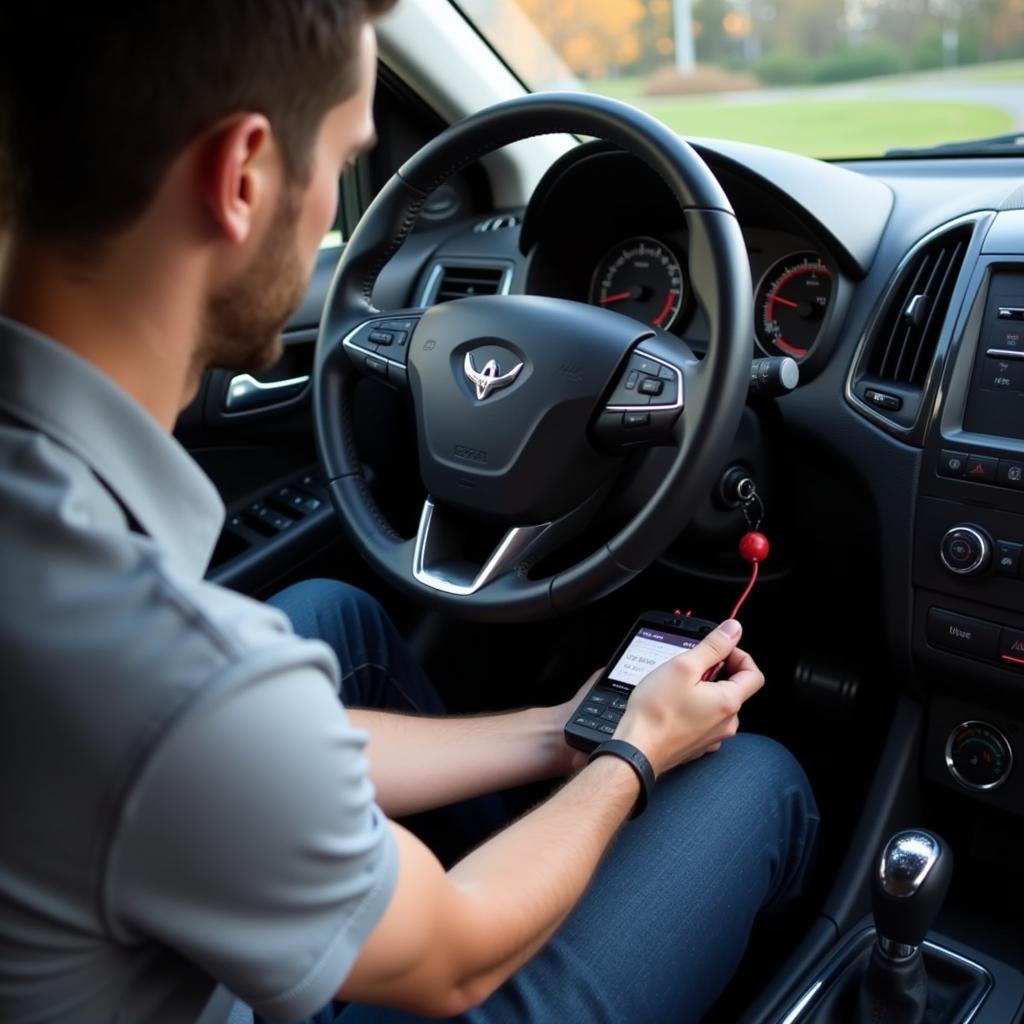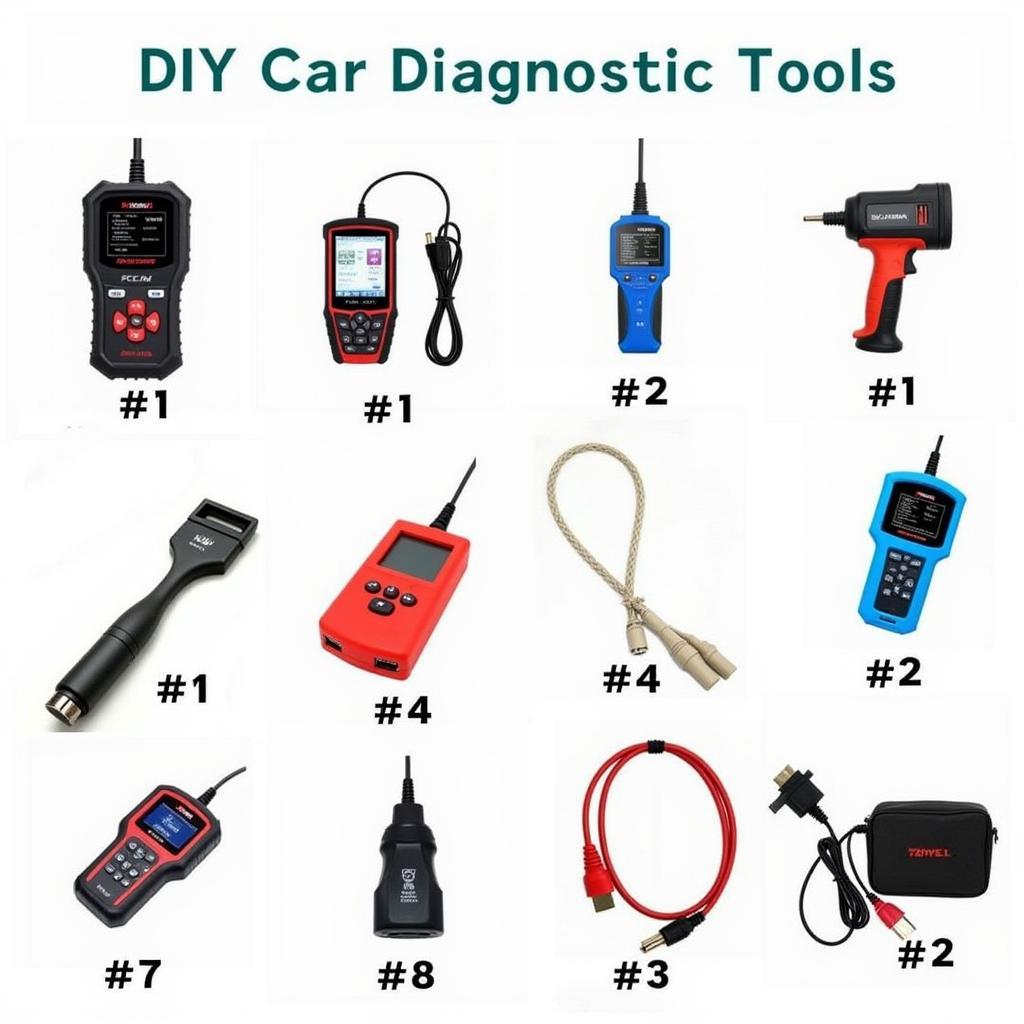As cars become increasingly sophisticated, so too does the technology required to diagnose their problems. Gone are the days of simply listening to an engine and hoping for the best. Today’s vehicles are complex machines that require equally complex tools to understand their inner workings. This is where a Diy Car Diagnostic Tool can be invaluable, empowering you to take control of your vehicle’s maintenance.
 Man using a DIY car diagnostic tool connected to a car’s OBD-II port
Man using a DIY car diagnostic tool connected to a car’s OBD-II port
What is a DIY Car Diagnostic Tool?
A DIY car diagnostic tool, also known as an OBD2 scanner, is a device that connects to your car’s onboard computer – the Engine Control Unit (ECU) – and reads diagnostic trouble codes (DTCs). These codes are like your car’s way of telling you something is wrong, providing clues about potential issues.
With a DIY car diagnostic tool, you can:
- Read and clear DTCs: Identify the source of “Check Engine” lights and other warning indicators.
- View live data streams: Monitor engine performance, fuel economy, and other crucial parameters in real-time.
- Perform basic component tests: Some tools allow you to run tests on components like oxygen sensors and evaporative emissions systems.
Why Use a DIY Car Diagnostic Tool?
There are several compelling reasons to consider adding a DIY car diagnostic tool to your toolbox:
- Save money on repairs: Identifying problems early can prevent costly repairs down the line.
- Empower yourself: Understanding your car’s health empowers you to make informed decisions about maintenance and repairs.
- Convenience: No more scheduling appointments and waiting at the mechanic’s shop. Diagnose problems at your own pace and convenience.
- Peace of mind: Regularly scanning your car for potential issues can provide valuable peace of mind, especially for long journeys.
 Various DIY car diagnostic tools on display, showcasing a range from basic code readers to advanced scan tools.
Various DIY car diagnostic tools on display, showcasing a range from basic code readers to advanced scan tools.
Choosing the Right DIY Car Diagnostic Tool
The market offers a wide range of DIY car diagnostic tools, from simple code readers to sophisticated scan tools. Choosing the right one depends on your budget, technical skills, and desired features.
Here’s a general breakdown:
1. Basic Code Readers:
- Affordable and user-friendly: Ideal for beginners who primarily want to read and clear DTCs.
- Limited functionality: May not provide live data streams or advanced features.
If you’re looking for an affordable option for basic diagnostics, you might want to explore options like the aldi car diagnostic reader.
2. Advanced Scan Tools:
- Comprehensive features: Offer live data, component testing, and advanced diagnostics.
- More expensive and complex: Require some technical knowledge and familiarity with car systems.
For those seeking advanced features and comprehensive diagnostic capabilities, checking out the options available at car diagnostic shops near me might be a good starting point.
3. Bluetooth Adapters:
- Smartphone integration: Connect to your phone or tablet via Bluetooth for a user-friendly interface.
- App-based functionality: Use third-party apps for diagnostics, data logging, and performance monitoring.
 A mechanic utilizing a professional-grade car diagnostic tool on a vehicle in a repair shop.
A mechanic utilizing a professional-grade car diagnostic tool on a vehicle in a repair shop.
FAQs about DIY Car Diagnostic Tools
1. Will a DIY car diagnostic tool work on my car?
Most DIY car diagnostic tools are compatible with vehicles manufactured after 1996 that are equipped with an OBD-II port. However, it’s always best to check the tool’s compatibility specifications before purchasing.
2. Can I fix my car with a DIY car diagnostic tool?
While a DIY car diagnostic tool can pinpoint the source of a problem, it won’t fix the issue itself. You’ll need the necessary mechanical skills and tools to perform repairs.
3. What is a DTC?
A DTC, or Diagnostic Trouble Code, is a code stored in your car’s ECU that indicates a specific problem or malfunction.
4. Can I use a DIY car diagnostic tool to reset my oil light?
Yes, many DIY car diagnostic tools allow you to reset oil life monitors and other service reminders.
Conclusion
Investing in a DIY car diagnostic tool can be a wise decision for any car owner looking to take a more proactive approach to vehicle maintenance. From identifying minor issues before they become major problems to saving money on costly repairs, the benefits are undeniable. As technology advances, these tools will only become more powerful and user-friendly, further empowering car owners to take control of their vehicles’ well-being.
If you need assistance finding the right DIY car diagnostic tool or understanding your car’s needs, feel free to reach out to us. Our team of experts is available 24/7 via WhatsApp at +1(641)206-8880 or email at [email protected]. We’re always here to help you keep your car running smoothly.

Leave a Reply